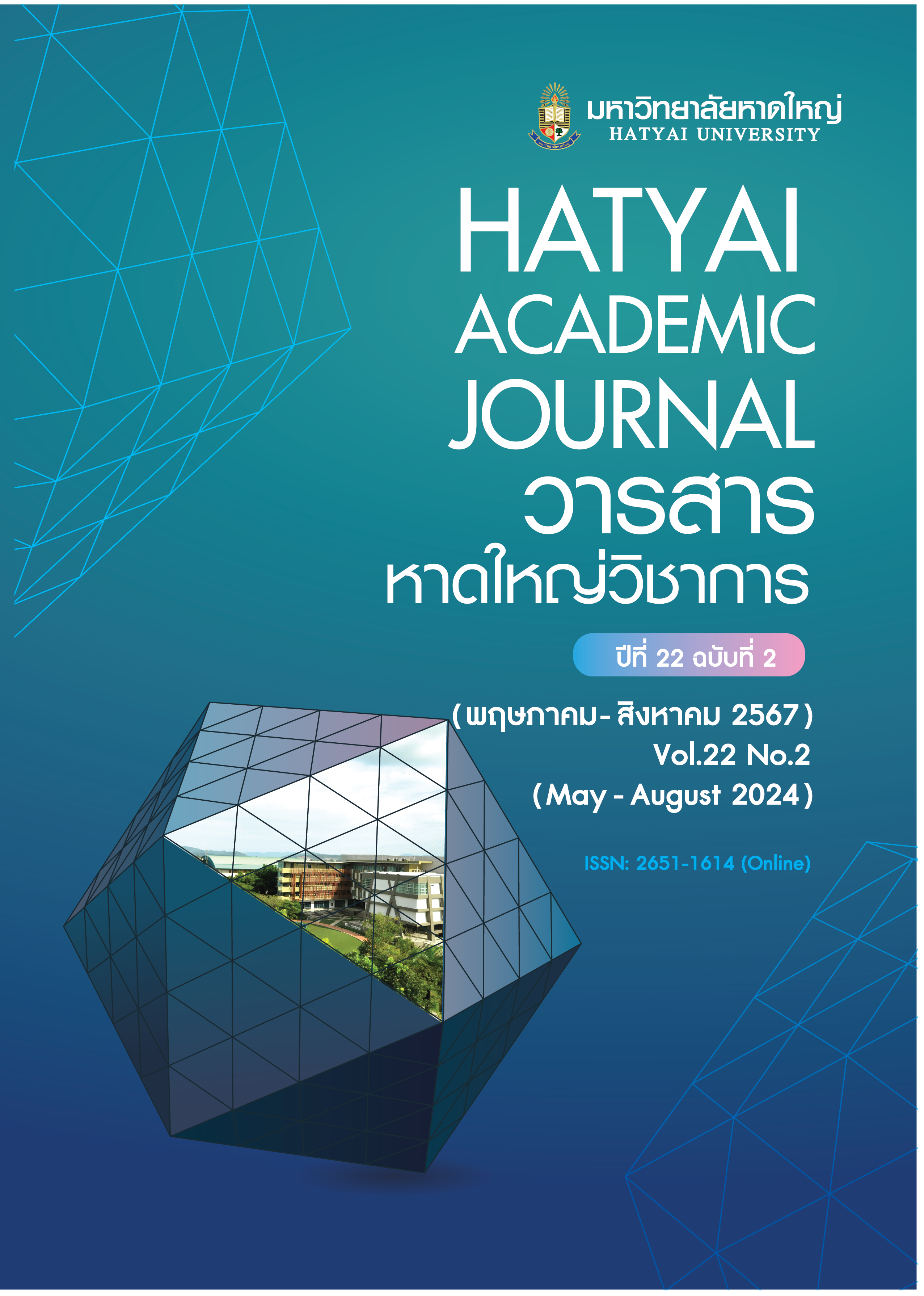Business Models that Affecting Competitive Advantage Strategy of Small and Medium Enterprise of Restaurants in Nonthaburi Province
Main Article Content
Abstract
The objectives of this research were to study the level of business model, the level of competitive advantage strategy, and the business models affecting the competitive advantage strategy of small and medium restaurant enterprises in Nonthaburi Province. The sample group involved 250 small and medium restaurant entrepreneurs registered as juristic persons in Nonthaburi Province and used proportional stratified random sampling. The tool used for the research was a questionnaire with a reliability level of 0.916. Stepwise multiple regression analysis was employed to analyze the data. The study revealed that the business model and the competitive advantage strategy were at a high level. The business model of key activities, key resources, and value propositions was positively affected by the competitive advantage strategy. However, an exception was customer segmentation that negatively affected competitive advantage strategies. The variables could collaborate to predict the competitive advantage strategy for (Adjusted R2) 78.40% and statistical significance at .05 level. Research findings allow restaurant entrepreneurs to create a model that is suitable for business; that is, providing products and services that meet the needs of consumers to gain a competitive advantage.
Article Details

This work is licensed under a Creative Commons Attribution-NonCommercial-NoDerivatives 4.0 International License.
All published articles are evaluated by three qualified peer reviewers from various institutions through a double-blind process, where reviewers do not know the authors’ identities and authors do not know the reviewers’ identities. The content and articles in the Hatyai Academic Journal reflect the authors’ views only and are neither the opinions of the editorial board nor the responsibility of Hatyai University. The Editorial Board of the Hatyai Academic Journal allows articles to be reproduced for academic purposes, on the condition that the original source is clearly cited.
References
Aungvaravong, C., & Yanakittkul, P. (2017). Business model analysis of health-supplement product from the organic rice-powder drink. University of the Thai Chamber of Commerce Journal Humanities and Social Sciences, 37(4), 92-109. [in Thai]
Clark, T., Osterwalder, A., & Pigneur, Y. (2012). Business model you: A one-page method for reinventing your career. New York: John Wiley & Sons.
Cochran, W. G. (1993). Sampling techniques (2nd ed.). New York: Wiley & Sons.
Dachum, P., & Ratanasuwongchai, N. (2018). Creative tourism identity and image in Bangkok neighboring area–Nonthaburi, Pathum Thani and Ayutthaya Provinces (Research report). Bangkok: National Research Council of Thailand (NRCT) and The Thailand Research Fund (TRF). [in Thai]
Demil B., & Lecocq, X. (2010). Business model evolution: In search of dynamic consistency. Long Range Plan, 43(2), 227–246.
Department of Business Management. (2022). Juristic person restaurant. Retrieved from https://datawarehouse.dbd.go.th/searchJuristicInfo [in Thai]
GSB Research. (2023). Restaurant business. Retrieved from https://www.gsbresearch.or.th/. published-works/economic-and-business-research/10876/ [in Thai]
Hair, J. F., Black, W. C., Babin, B. J., & Anderson, R. E. (2014). Multivariate data analysis (7th ed.). Upper Saddle River, NJ: Prentice Hall.
Hill, L. C., Jones, G. R., & Schilling, M. A. (2015). Strategic management theory (11th ed.). Stanford, USA: Cengage Learning.
Johnson, M. W. (2018). Reinvent your business model. Boston, Massachusetts: Harvard Business Review Press.
Kasikorn Research Center. (2023). Restaurant business in 2023 is expected to expand by 7.1 percent YoY. Current Issue No.3429. Retrieved from https://www.kasikornresearch.
com/en/analysis/k-econ/business/Pages/Restaurant-Business-Y23-CIS3429-B-24-08-2023.aspx [in Thai]
KBank. (2023). What is SME and SME business? How many types are there? Let's understand each other. Retrieved from https://www.kasikornbank.com/th/kbiz/article/pages/ guide-for-sme-business-and-how-it-works.aspx [in Thai]
Krungsri GURU SME. (2023). Restaurants-a profitable industry with a bright future. Retrieved from https://www.krungsri.com/th/plearn-plearn/restaurant-make-money-future
[in Thai]
Kwarteng, K. C., Osman, B., & Acheampong, S. (2020). Performance of restaurants: Recognizing competitive intensity and differentiation strategies. Journal of Tourism, Heritage & Services Marketing, 6(3), 25-34.
Pedhazur, E. J. (1997). Multiple regression in behavioral research: Explanation and prediction. Stamford, CT: Thomson Learning.
Ponanake, P., & Pattanasumpan, A. (2021). Building competitive advantage of niche restaurants in Bangkok amidst COVID-19 Pandemic. Interdisciplinary Sripatum Chonburi Journal, 7(3), 77-90. [in Thai]
Pongvichai, S. (2011). Computer statistical analysis (22nd ed.). Bangkok: Chulalongkorn University Press. [in Thai]
Porter, M. E. (1998). Competitive strategy: Techniques for analyzing industries and competitors. California: The Free Press.
Sangaroon, J., Esichaiku, R., & Thongbai, K. (2021). Strategic business model development of healthy food from bamboo mushroom (Dictyophora Indusiata). Dusit Thani College Journal, 15(2), 208-226. [in Thai]
Tammabamrung, P. (2016). Competitive advantage strategies of Thai restaurant business (Doctoral dissertation). Silpakorn University, Bangkok. [in Thai]
Thanatumrongkul, K., Srinaruewan, P., Thechatakerng, P., & Maneepun, P. (2020). Business model to create competitive advantage of agricultural machinery distribution business in Chiang Mai Province. Sisaket Rajabhat University Journal, 14(2), 51-62. [in Thai]
The Office of Strategy Management North Central 1. (2023). Nonthaburi province general information. Retrieved from http://www.osmnorthcentral1.go.th/nonthaburi/about [in Thai]
Trade Policy and Strategy Office. (2023). Food and beverage business situation in Thailand: Challenges and adaptation for the survival of food and beverage establishments. Retrieved from https://uploads.tpso.go.th/0Rev1.pdf [in Thai]
Yamane, T. (1973). Statistics: An introductory analysis (3nd ed.). New York: Harper and Row.
Yun, J. J. (2017). Business model design compass. Singapore: Springer.


